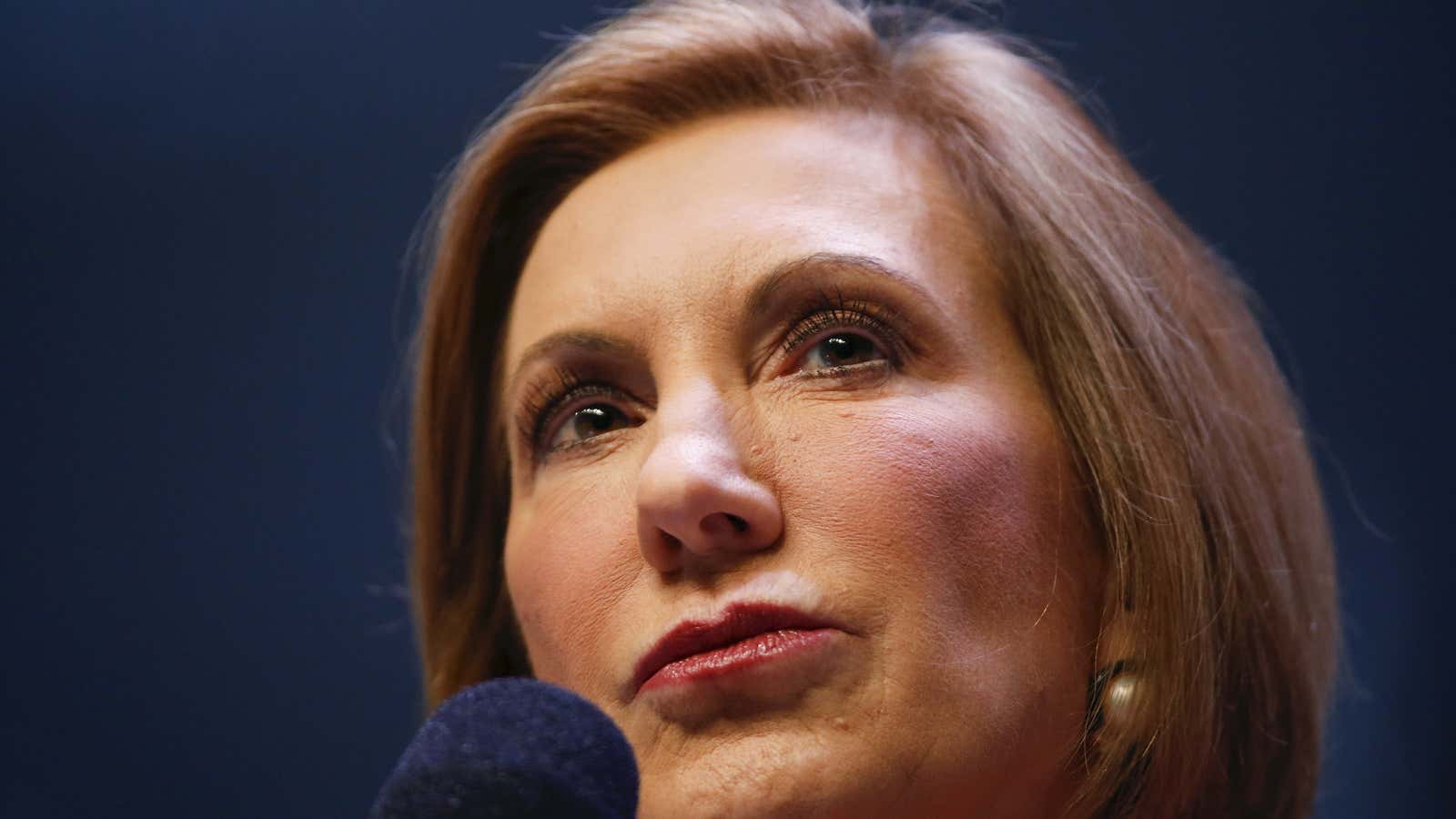After what has widely been hailed as an impressive performance during the CNN-hosted GOP frontunner debate last week, presidential candidate and former Hewlett Packard CEO Carly Fiorina has jumped to second place in the Republican field, with 15% of overall support. This is not surprising, given that 52% of those who watched the debate deemed Fiorina the winner.
But while her performance was superficially strong, it was also an important reminder that empowering women is about more than platitudes and standing up to the boys’ club.
To begin with, Fiorina’s two largest applause generators of the evening were related to what are undoubtedly gendered issues: Namely, Donald Trump’s earlier comments about her face, and her own stance on Planned Parenthood.
Given an opportunity to respond to Trump’s remarks about her, Fiorina said simply “I think women all over this country heard very clearly what Mr. Trump said.” Her response was met with raucous applause from the Reagan Library audience, and hailed on Twitter and in the media as the moment she “owned” her rival. Classy where others are boorish, Fiorina cut a striking figure—a woman who could hold her own, whether fielding sexist attacks or questions on military budgets. But while it was indeed incredibly satisfying to have seen a woman use so few words to silence the famously effusive Donald Trump, it is ironic that the candidate looking to re-energize female voters would simultaneously support policies that actively disempower them.
Perhaps the biggest example of this disconnect is represented by Fiorina’s crusade against Planned Parenthood. When discussing recent videos released to discredit the health care nonprofit, Fiorina gave an impassioned speech directly to the camera in which she implored president Obama to watch some of the footage. Although the scenes she described literally do not exist, her self-described fight for “the character of our nation” was again met with loud and sustained applause.
This is the Fiorina conundrum: How to treat a woman who hopes to attract more women to the Republican party, yet doesn’t care to cater to their needs, who claims to want to “reclaim” the term feminism for the GOP, yet who doesn’t seem to know what the word “feminism” actually means.
In June, Fiorina stated that “feminism has devolved into a left-leaning political ideology where women are pitted against men and used as a political weapon to win elections … A feminist is a woman who lives the life she chooses.” This is simply not the case. As Chimamanda Ngozi Adichie said quite accurately, feminism is the belief in the social, political, and economic equality of the sexes. It is not a left-wing tactic, nor is it a zero-sum game in which women can only rise up when men are brought down.
A phrase that Fiorina uses often during debates and speeches, is that “all issues are women’s issues.” This is a truism, and a particularly harmful one, as it distracts from Fiorina’s negative stance on many issues that directly affect women. It would be nice if women had the same access to health care and professional development, just as it would be lovely if wage inequality was a thing of the past. Since none of those things are reality, Fiorina’s apparent dismissal of so-called “women’s issues” rings incredibly false.
For instance, Fiorina has said on multiple occasions that she does not support the Paycheck Fairness Act, or the Lilly Ledbetter Fair Pay Act, saying that these are “tokens… that don’t truly help women advance.” Her suggestion to close the wage gap is, somewhat confusingly, to dismantle unions and other entities that reward workers under a “seniority system,” which she argues unfairly reward men. Fiorina seems to have missed the federal data that shows that the wage gap for unionized women is 40% smaller than for non-unionized women.
As for federal, paid maternity leave legislation, which exists in all other advanced economies, Fiorina has expressed similar opposition. In an interview with CNN, she said, “I don’t think it’s the role of government to dictate to the private sector how to manage their businesses.”
For those keeping score at home, this means Fiorina is explicitly opposed to the government interfering with the workings of a private business, while at the same time so in favor of the government having control over a woman’s body that she would rather shut it down than let women make their own choices regarding their health and wellbeing.
It’s really that simple: Carly Fiorina cares more about the autonomy of businesses than she does about the rights or welfare of women. When Sarah Palin ran for vice president in 2008, she, too, tried to position herself as the candidate who cared the most about female voters. Then, as now, it’s important to remember that this isn’t automatically the case. And no amount of snappy one-liners or well-delivered platitudes should negate her lies about Planned Parenthood, or her incredibly harmful stance on gender equality. Ultimately, Carly Fiorina is not a good candidate for president—for women, or for men.
